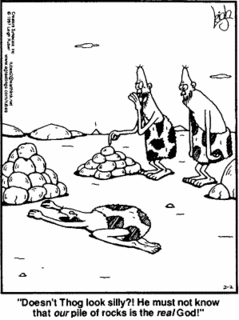 As a follow-up to my post from earlier today about atheism and the meaning of “god” I thought I would offer here some further thoughts that I also shared in comments on that post.
As a follow-up to my post from earlier today about atheism and the meaning of “god” I thought I would offer here some further thoughts that I also shared in comments on that post.
If someone objects to calling something or someone a “god” because that is not an accepted use of that word in English, that is a linguistic point.
But if you say “that isn’t really a god” about a view with a long established history of such usage – as for instance in pantheism as a way of referring to Nature – then that is not a linguistic point, but a theological one.
I suspect that the view of most atheists is that (1) the gods of ancient polytheists and modern monotheists are not real entities with the attributes depicted in their sacred texts, and that (2) no entities, including persons, cats, and nature, are worthy of worship and reverence. In the latter case, it is not so much denial of existence as a rejection of the claim to be deserving of a certain kind of honor.
Anyone want to start using the term aproskynism? 🙂













